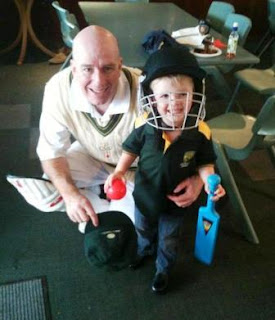Cricket's Mums and Dads.
By Owen Zupp.
Whether the elite sportsperson is standing upon the Olympic dias or holding the Ashes aloft, there are very few who do not recognise the important role played by their parents. Whether it was those laps at the local pool at 5am or the country cricket carnival 500km away, Mum and/or Dad was there.
For it's in those early years that so much sporting development takes place. There is the obvious honing of ability, but there is also the establishment of a work ethic and the appreciation of the game to be instilled. Coaches can only do so much, whereas the parents are there for the long haul. And those parents need not be sporting achievers in their own right.
In my case, my father could not have been further removed from having a sporting background. A child of the 'Great Depression' years, his father would point at boys playing cricket and reaffirm that it was a total waste of time. There was work to be done on the farm and sport was just wasted daylight. And yet this did not taint my father's outlook when his own sons came along.
My brother wanted to be George Best and play for Manchester United and I wanted to play the 'come to attention' drive just like Doug Walters. In retrospect, such dreams must have seen fanciful to my Dad, but that didn't matter to him. He was still the first one to volunteer to mow the oval or mark the side lines with lime powder. (Just don't ask him to score, umpire or be a linesmen. He never could grasp 'off-side' or 'leg before wicket') To him, it was time with his kids and if they regarded it as important, then he would support them to the hilt.
For my cricketing endeavours that meant driving me all over Sydney from our home in the heart of the western suburbs. And if he was flying that morning, he would come straight to the ground after he landed, with a jumper hurriedly pulled on over his uniform. He would then sit in the stands amongst 'expert' fathers, totally at a loss regarding their language. One day on the way home he mentioned that the 'experts' had mentioned that I was playing with a "nice straight bat". I explained what they meant and he was greatly relieved when he expressed to me that, "I spent $100 on that bat, it would bleedin' well want to be straight!"
My Dad loved spending time with his kids and I'll never forget that. He would kick soccer balls with us until it was dark and the way he used to 'head the ball' must have nearly rendered him concussed. When we broke a window, he followed suit and kicked a ball clean through a fibro panel about ninety degrees from where he was aiming. Gold Dad, absolute gold!
Probably my favourite memory is going to the nets with Dad one season when I was playing Green Shield in Sydney. At the nets he would generally stand at half a pitch length and throw some balls down to me. This day he decided to bowl off a length. Dad's only training at throwing was in World War Two as a Commando and he literally threw like it. Years later I was batting against John Dyson and he was throwing loopy off-breaks at me which I prodded away. John mentioned that I was batting as if he was "throwing hand grenades". My thoughts immediately went to my Dad and brought the broadest grin to my face.
So now, here I am, twenty years after he passed away and my Dad is still bringing a smile to my face. A smile that comes from time spent together at cricket grounds near and far. He never wanted or needed me to wear a 'baggy green', he was happy to sit in the stands, support me and appreciate the fact that 'duck' or draw, I loved the game. He couldn't play the game, but he was with me every step of the way and I will never forget that.
So to all the Mums and Dads that do the early starts and the hard miles. For all the hours of scoring, umpiring and de-facto coaching. Thank you. For whether your child makes the Under 14D's or captains his nation like Michael Clarke, they will appreciate your effort and those golden times forever. Cricket is in itself just a game, but the bonds that can grow from the endeavour are timeless; be they team-mates, coaches or parents. My father was definitely no sportsman and yet he grew even closer to his children through sport and though he is now long gone, I still treasure those times.
Maybe that's another reason why cricket matters.






